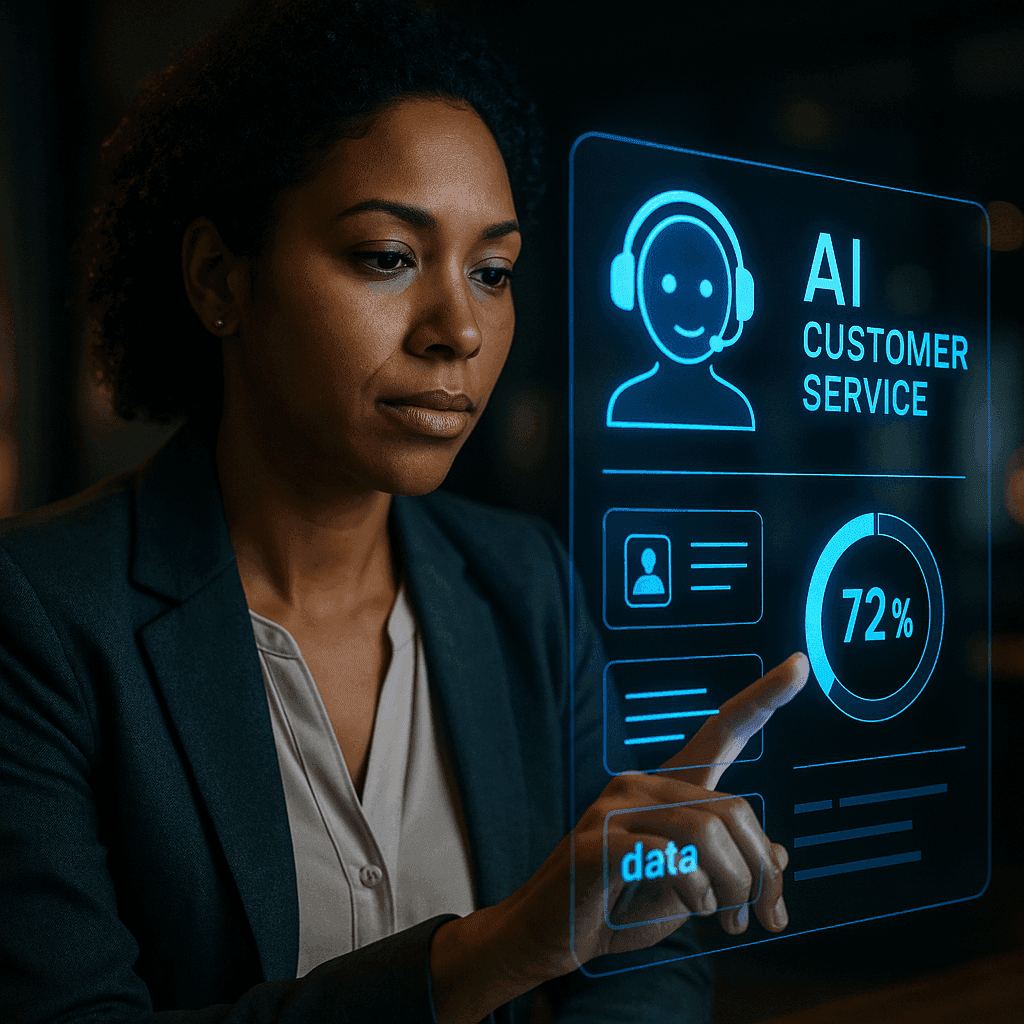The Great AI Reshuffle: Which Jobs Are Out, Which Are In?

The Great AI Reshuffle: Which Jobs Are Out, Which Are In?
Remember those sci-fi movies where robots took over everything? Well, hold onto your hats, because the future is officially now. The AI revolution isn't just a distant rumble anymore; it's a full-blown earthquake shaking up the global job market in 2025. And while it might sound a bit scary, it's also creating incredible new opportunities for those ready to adapt.
At Voice2Me.ai, we're all about making AI work for you, not against you. So, let's dive into what this means for your career, your business, and the jobs of tomorrow.
The AI Jobquake: What's Happening Right Now?
Let's be real: AI is already making its mark. By 2025, a whopping 85–92 million jobs globally are expected to be displaced. Think of it like a massive game of musical chairs, but with algorithms calling the shots. Yet, here's the kicker: around 97 million new roles are emerging, leading to a net gain of about 12 million positions. It's not just a story of loss; it's a story of transformation.
In the U.S. alone, nearly 47% of workers' roles are considered at risk in the next decade. Some sectors are feeling the pinch more than others:
- Customer Service Representatives: With an 80% automation rate projected by 2025, those friendly chat windows are increasingly powered by AI.
- Data Entry Clerks: Brace yourselves for automated document processing. An estimated 7.5 million of these jobs could disappear by 2027.
- Retail Cashiers: Ever used a self-checkout? So has AI, and it’s getting pretty good at it. A 65% automation risk by 2025 means fewer human-operated tills.
- Truck and Delivery Drivers: Self-driving vehicles aren't just for sci-fi movies anymore, putting 1.5 million trucking jobs at risk by 2030.
Essentially, if your job involves a lot of repetitive, predictable tasks, AI is probably already eyeing it up. We’ve already seen 76,440 U.S. jobs eliminated by AI this year, with companies like Amazon and Microsoft making headlines for AI-driven layoffs. And here's an interesting, if slightly uncomfortable, stat: 30% of U.S. companies have already replaced workers with AI tools like ChatGPT. Yes, that ChatGPT.
The Silver Lining: Where the New Jobs Are (and How to Get Them)
Okay, so some jobs are fading. But guess what? A whole new universe of roles is exploding into existence! This is where the magic happens, and where Voice2Me.ai plays a role in fostering these human-AI collaboration roles.
- AI-Related Superstars: Ever heard of a Prompt Engineer? How about an AI Ethics Officer? These roles, focused on guiding, refining, and overseeing AI, are booming. We're talking an estimated 350,000 new roles in 2025 alone.
- Human-AI Collaboration Heroes: Think less "robot vs. human" and more "human plus robot." Jobs that combine human oversight, creativity, and problem-solving with AI capabilities—like quality assurance for AI outputs, creative direction, or designing AI policies—are becoming invaluable.
- Resilient Sectors: Roles demanding empathy, critical thinking, and complex problem-solving are proving most resilient. Hello, healthcare, education, and green technology! These fields need that uniquely human touch that AI just can’t replicate (yet).
The takeaway? Upskilling isn't just a buzzword; it's your new superpower. Businesses and governments are launching retraining programs, but the real advantage goes to those who proactively embrace digital literacy and AI skills.
Real-World AI Stories (It's Already Happening!)
It’s not just talk. This transformation is already underway.
- Amazon & Microsoft: Both tech giants have seen layoffs in 2025 directly linked to increased automation and AI adoption.
- Retail Revolution: Next time you're at the supermarket, notice how many self-checkout kiosks there are. Some stores are even piloting minimal-staff models, largely run by AI.
- Call Center Evolution: Many companies, from global BPOs to airlines, are rolling out AI conversational agents, leading to significant shifts in traditional support roles.
In fact, one study found that 13.7% of U.S. workers report having lost their job directly to a robot or AI-driven automation. It's not a future threat; it's a current reality for many.
Peering into the Future: What's Next?
Experts predict this acceleration isn't slowing down. By 2030, half of workers in advanced economies might need to retrain or shift roles entirely. By 2045, AI could automate roughly 50% of current tasks worldwide.
But don't despair! The goal isn't to replace humans, but to augment them. The future workplace will likely feature human-AI teams as the norm, where collaboration, oversight, and innovative problem-solving become your most valuable assets.
Navigating the AI Tsunami: Your Action Plan
So, what does this mean for you and your business?
- AI is Here, Now: Stop thinking about job displacement as a distant threat. It's happening today, particularly for entry-level and repetitive roles.
- Upskill, Upskill, Upskill: This isn't optional. Invest in digital literacy and AI skills for yourself and your team. Embrace prompt engineering, data analysis, and human-AI collaboration strategies.
- Rethink Roles: For businesses, redesign job tasks to emphasize uniquely human strengths: creativity, empathy, strategic thinking, and complex problem-solving.
- Embrace Human-AI Teams: The future isn't humans or AI; it's humans with AI. Foster environments where these collaborations thrive, driving efficiency and innovation.
The AI revolution is a powerful current, but with strategic planning and a proactive mindset, we can navigate it to build a more productive and engaging future workforce. Voice2Me.ai is here to help you harness that power.
More Articles

The CX Revolution: 65+ AI Customer Service Stats You Need for 2025
Explore how AI is rapidly transforming customer service by 2025, from lightning-fast chatbots to hyper-personalization, and why a human touch still matters.

Is AI Taking Over Customer Service? What 2025 Really Looks Like
Explore how AI is reshaping customer service in 2025, from hyper-personalization to autonomous agents, and discover the essential balance between efficiency and the human touch.